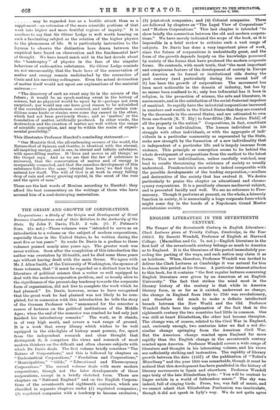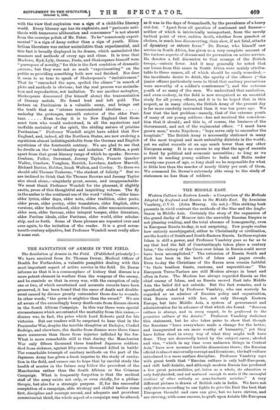ENGLISH LITERATURE IN THE SEVENTEENTH CENTURY.
The Temper of the Seventeenth Century in English Literature: Clark Lectures given at Trinity College, Cambridge, in the Year 1902-3. By Barrett Wendell, Professor of English at Harvard College. (Macmillan and Co. 7s. net.)—English literature in the first half of the seventeenth century belongs as much to America as to England. It is the literature of the period immediately pre- ceding the parting of the ways, and each nation may claim it as an heirloom. When, therefore, Professor Wendell was invited to deliver the Clark Lectures at Cambridge it was natural for him to choose this period as his theme. A particular interest attaches to this book, for it contains "the first regular lectures concerning English literature ever given by an American at an English University." The fact that strikes the mind most in the literary history of the century is that while in America literary form, in so far as it existed, underwent no change, the change in England from 1600 to 1700 was revolutionary, and therefore did much to make a definite intellectual breach between the New World and the Old. Professor Wendell finds here the explanation of the fact that in the eighteenth century the two countries had little in common. One was still at heart Elizabethan, the other had become Georgian. The change was, of course, related to the Civil War in England, and, curiously enough, two centuries later we find a not dis- similar change springing from the American Civil War. But the American change reacted upon England far more rapidly than the English change in the seventeenth century reacted upon America. Professor Wendell covers a wide range of literature and thought in his interesting volume, and his views are sufficiently striking and instructive. The rapidity of literary growth between the date (1557) of the publication of "Totters Miscellany" and the year 1660 was remarkable, though it must be noticed that this development has been paralleled in the history of literary movements in Spain and elsewhere. Professor Wendell says truly of the late Elizabethan lyric: "You will be content to linger awhile in a world of fathomless music." The sky was, indeed, full of singing birds. Prose, too, was full of music, and we cannot admit that Elizabethan Puritanism was inarticulate, though it did not speak in Lyly's way. We do not quite agree with the view that euphuism was a sign of a child-like literary world. Every literary age has its euphuists, and " parisonic anti- thesis with transverse alliteration and consonance" is not absent from the overripe polish of Mr. Pater. To be "consciously experi- mental" is a sign of decay rather than a sign of youth. Eliza- bethan literature was rather assimilative than experimental, and this fact is broadly displayed in its drama, which assimilated the manners and methods of every age and clime. It is true that Marlowe, Kyd, Lyly, Greene, Poole, and Shakespeare himself were "purveyors of novelty," for this is the first condition of dramatic success; but they were not so much "experimenting" on the publics as providing something both new and finished. Nor does it seem to us true to speak of Shakespeare's "imitativeness." That he "ransacked the ages, spoiled the climes" in search of plots and methods is obvious ; but thp real process was assimila- tion and reproduction, not imitation. To use another metaphor, Shakespeare discovered (for himself alone) the transmutation of literary metals. He found lead and left gold. The lecture on Puritanism is a valuable essay, and brings out
the truth that an "intense transcendental idealism underlay the grotesque, uncouth exterior of the elder Puri- tans Even to-day it is to New England that those must turn who would understand, in all the mysterious and ineffable certainty of the spirit, the abiding nature of pristine Puritanism." Professor Wendell might have added that New England, and, indeed, all the Northern States, are now evolving a mysticism almost indistinguishable from the German and English mysticism of the fourteenth century. We are glad to see that he dwells on the "individuality and isolation" of Milton, a peak apart from that great literary range of which he speaks : Browne, Denham, Fuller, Davenant, Jeremy Taylor, Francis Quarles. Waller, Crashaw, Vaughan, Herrick, Lovelace, Andrew Marvell, Richard Baxter, Hobbes, Izaak Walton, and Cowley. To these we should add Thomas Traherne, "the student of felicity." But we are inclined to think that Sir Thomas Browne and Jeremy Taylor also stood alone,—singularly great, serene, and unapproachable. We must thank Professor Wendell for the pleasant, if slightly exotic, prose of this thoughtful and inspiriting volume. The fly in the amber is the continual use of the word "elder,"—elder time, elder lyrics, elder days, elder note, elder tradition, elder poets, elder prose, elder poetry, elder translators, elder English, elder versions, elder brotherhood, elder freedom, elder unconsciousness, elder men, elder fervour, elder integral temper, elder literature, elder Puritan ideals, elder Puritans, elder world, elder scholar- ship, and so forth. Some of these phrases are repeated over and over again, to the irritation of the reader. It is a good seven- teenth-century adjective, but Professor Wendell must really allow it some rest.































































 Previous page
Previous page